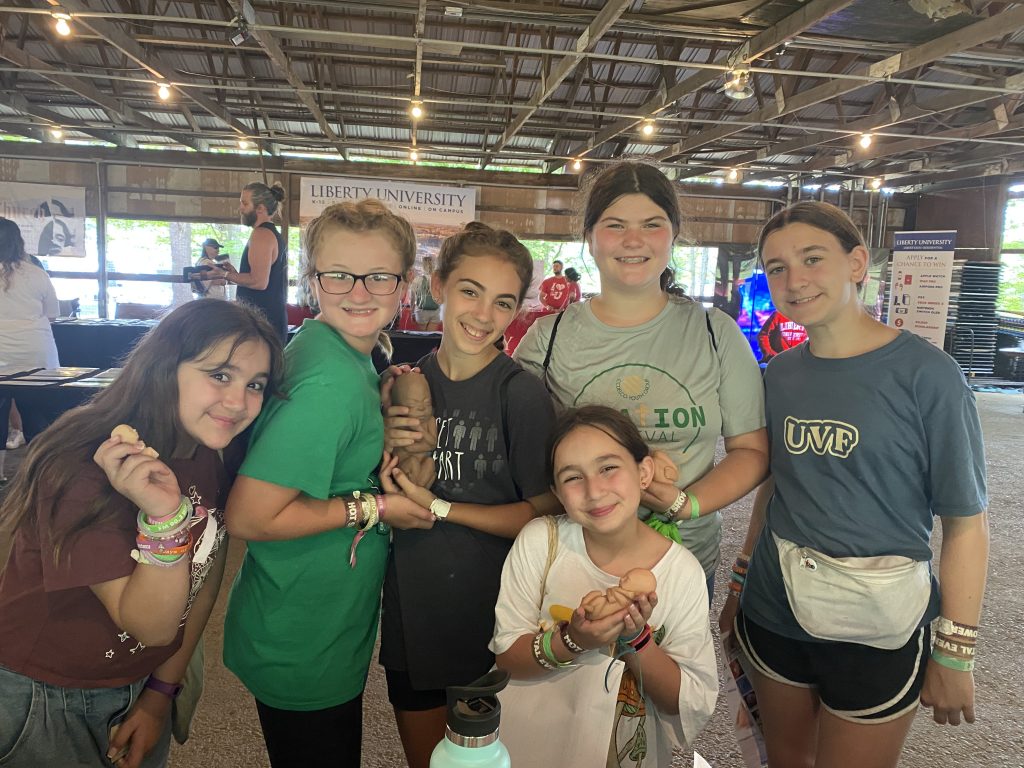by Bonnie Finnerty, Education Director

It’s the babies. Always the babies. Every time I set up an educational display, it’s the fetal models that draw people to our table like moth to flame. And that was the case at Creation Music Festival, a Christian music event attended by tens of thousands of people each year.
It’s become a predictable pattern. The babies are spotted from a distance. People approach, touch them, hold them, marvel at them. A conversation ensues. Information is shared. Stories are told. Many different stories.
Like the woman told to abort her child twenty-four years ago, after a sonogram revealed that her child had no brain. She refused and instead prayed that a future test would show a different result. It did. Her daughter was born perfectly healthy.
Two different women told me their stories of getting pregnant as teens and being pressured to abort by their families. Despite feeling alone and unsupported by those closest to them, both women refused abortion, choosing open adoption instead. Both have a beautiful, loving relationship with the children who once grew within their bodies. One even shared the picture of her six-year-old biological son who is thriving with his adoptive family.
Over four days, I talked with hundreds of people and listened to dozens of stories. Many young children delighted in holding our babies and posing for pictures. The one group I did not anticipate the babies attracting, however, were those who were post-abortive.
Never before had so many people disclosed to me that they had one or more abortions. All of them said they silently bore shame and grief for years afterward.
One woman came to our table with her teenage son. She was born into a politically-connected liberal family that counted Faye Wattleton, the former head of Planned Parenthood, as a close friend. Raised to think abortion was no big deal, she had a few. But she was not at peace. She suffered. She regretted. She mourned. She felt that she had been lied to. It was only through a relationship with Christ, she said, that she finally found forgiveness and peace. And she wants her son to learn from her journey and be armed with the truth.
Then there was another young woman looking to start a Respect Life ministry in her church, hoping to use some of the literature we had on our table. She told me that she had an abortion many years ago. Anytime abortion was brought up at church, she would inwardly panic, thinking her body language would reveal to everyone the secret she carried for so long. It was by encountering another post-abortive woman who shared her testimony that she finally got the courage to talk about her abortion. She found healing in a program called Surrendering the Secret. Now she hopes to help others choose life.
On the last day, it was a man that stopped by. With his long hair, red bandana, and heavily tattooed body, I could easily imagine him riding his Harley to the festival. He almost walked by, but suddenly turned around. He stared at the babies. “Hard to believe that we even have to tell people they are human beings,” he said. I agreed.
Then he shared his story. When he was a young man, he discovered his wife had an affair with his own brother. She became pregnant. Heartbroken over the dual betrayal, he paid for her abortion. For many years it haunted and grieved him. He told me he wasn’t always a Christian but is now. It is how he has found forgiveness, healing, and love.
There were several others who disclosed their abortions. They didn’t have to. They could have walked by. They could have stopped and not shared that piece of themselves. But they did stop. Did share. They want others to know. Not just their woundedness, but their redemption. Not just their hurt, but their hope.
As we enter a post-Roe America, let’s remember that so many have been wounded by abortion. Some are healed. Many are not. They sit at our tables, in our pews, and on the other side of our computer screens.
Let us love them into the truth. Let us pray for their healing. Let them feel our acceptance, not judgment. Let us be bridges, not walls.
It’s often said that the church is not so much a museum for saints, but a hospital for sinners. Let us say the same for the pro-life movement.
